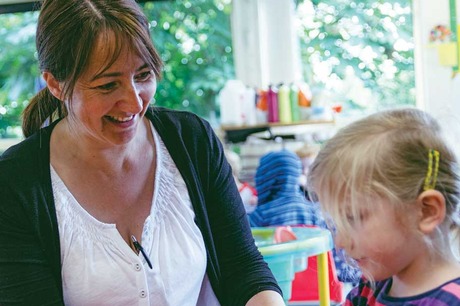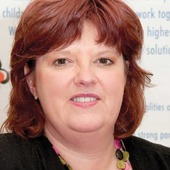courses for EYTs. Hannah Crown reviews their performance.

Nursery chains have embraced the Early Years Teacher Status (EYTS), the latest Government qualification designed to raise standards and increase public recognition for the sector. These 'graduate leaders' were introduced as a new take on the Early Years Professionals (EYPs). For Early Years Teachers (EYTs), training standards and entry requirements are aligned with the Qualified Teacher Status of those working in primary and secondary school. Many settings view EYTs and EYPs as being on a par, saying that though entry requirements for EYPs were less stringent, they are often among the most experienced practitioners in a setting.
For chains, EYTs offer a key means of upgrading practice. They can lead staff training, relieve the pressure on managers and boost the confidence of all staff. But concern remains that the EYT qualification, though vaunted as 'equivalent' to QTS by politicians, does not carry with it the same pay and conditions.
Crucially, Government funding is available for both the graduate entry mainstream (GEM) and employment-based (GEB) routes to EYT status. For the GEB route this is £14,000, covering the training course fees of up to £7,000, with the remainder paid to the employer for supply cover for the trainee or other support costs.
Snapdragons is a family-owned, eight-nursery chain with capacity for 654 children. It employs an EYT in each of its settings. In addition, it also has three supernumerary 'head' EYTs in settings with more than a hundred children, and is recruiting for a fourth.
The chain has forged links with several external training providers. Jennifer Biddel, operations director, sits on the University of Gloucestershire's steering group for early years initial teacher training, along with other nursery, children's centre and local authority representatives. The group was formed in March.
'The main input so far has been to the selection process for the prospective EYT candidates,' Ms Biddel explains. 'We also discuss, as a group, what sort of training we feel EYTs need that we may not see in our existing EYTs.' This, she says, is 'mostly to do with getting the right experience, for example, providing them with a mentor with EYT experience.'
Sian Wyman, course leader for Early Years Initial Teacher Training (EYITT) at the university, says the benefits are 'quality assurance - reassurance that what we are doing is correct. This also provides opportunities for students - perhaps a student wants to experience working with babies or see what it is like to work in a brand new nursery. It's a way of bringing practice into the theory.' The course, the Postgraduate Certificate in EYITT, is a GEB route, with ten days a year spent at university.
Snapdragons' second training partner is a teaching school alliance, Pickwick Learning. This is a new, not-for-profit organisation delivering training and support to its member organisations (mainly schools) and also external bodies. Co-founder Snapdragons is the only nursery member, and is planning to send its staff to provide training for students on the early childhood studies degree and EYITT courses.

The chain also collaborates with Best Practice Network, a private training company. Snapdragons' managing director Rosemary Collard has helped the company recruit and interview students for its EYT courses this year, while also hosting students on placements from other providers such as the University of the West of England and Bath Spa.
For Snapdragons, formal EYT training continues in the workplace through a hierarchy of EYTs. The three head EYTs are line-managed by two experienced 'mobile' EYPs with QTS, Catherine Bond, and Janey Palliser. The pair are developing a rolling six-month programme of training based on areas they have identified such as child behaviour and observation and assessment.
Ms Bond says, 'The head EYTs work with nursery managers in a dual role. The EYTs deal with learning and development, which is two-thirds of the EYFS, while the manager runs the setting.' EYTs also support and mentor the staff, and monitor aspects such as enabling environments and learning journeys. 'This leads to much happier staff because they feel supported, valued and listened to,' she says.
The three 'head' EYTs have, respectively, EYPS, a PGCE in early years and EYTS. Ms Biddel adds, 'It is not that our EYP carries out EYT functions, more that we consider their functions to be the same. Some of our most experienced practitioners completed the EYP route and we believe that they are just as knowledgeable, if not more so in some cases.'
One of the best things about the EYT qualification, Ms Biddel says, is its effect on the confidence of the practitioner, who may have 'academic knowledge but little experience of working in a setting'.
She says, 'We have brilliant practitioners but confidence is one of the biggest things that we battle. The status gives people a sense of professionalisation.
'But it is hard to attract the right sort of candidate (to train as an EYT) because they won't have QTS. We can't offer them the pay and conditions that a school can. And we do worry they will get out and go and teach in academies as some people have.' Ms Biddel adds that one of the aims of Gloucestershire University's steering group is to raise the profile of the EYT, with a conference planned on the issue next year.
Bright Horizons, the UK's second biggest nursery chain, has partnered with Kingston University to deliver its teacher training programme. The company purchases the university teaching through the early years arm of the School Direct programme, a Government initiative brought in by Michael Gove, whereby nurseries and early years schools can recruit and train their own staff. This is the scheme's pilot year after which it will be reviewed by the National College for Training and Leadership (NCTL).
 As the only private nursery provider on the programme, Bright Horizons has recruited five graduates onto Kingston's GEM route, who started in September 2014. The students will do their workplace training with the company, a school and children's centre, as well as taking specialist additional Bright Horizons training in areas such as child protection, first aid, and ECERS and ITERS rating scales. The company has the expectation of employing them when they graduate, says Nicola Amies, head of early years (pictured).
As the only private nursery provider on the programme, Bright Horizons has recruited five graduates onto Kingston's GEM route, who started in September 2014. The students will do their workplace training with the company, a school and children's centre, as well as taking specialist additional Bright Horizons training in areas such as child protection, first aid, and ECERS and ITERS rating scales. The company has the expectation of employing them when they graduate, says Nicola Amies, head of early years (pictured).
At the start of the course, both bodies interview applicants together at the university. An applicant will go on to work in a setting for a day, observed by nursery staff, before being offered a place on the one-year course.
Jessica Johnson, senior lecturer in early years education at Kingston University, says the partnership 'raises awareness right from the beginning. Bright Horizons offers membership of TACTYC (The Association for the Professional Development of Early Years Educators) which reinforces our encouragement of engagement with current research and journal article critiquing.' It is also useful to have 'the employer perspective about EYPs and EYTs and where they sit,' she adds.
Bright Horizons also worked on the national EYT standards, which do not mention play, with NCTL. But, Ms Amies says, 'That is not to say we and Kingston are not teaching our students about the value of play - all students will have a robust understanding of play. That is the beauty of being able to influence (the training).'
Ms Johnson adds 'Play is integral to all aspects of our programmes, certainly not only in placement.' Play theory is taught and assessed in written work and portfolios, but, Ms Johnson adds, 'so much of it is how they are going to tune it to their settings and getting the sense of wonder and creativity and going on a journey together with the children.'
At Bright Horizons, EYTs 'lead on quality improvement and are specialists in supporting children's care, learning and development,' Ms Amies says. She cites the case of Kat Learner, who has a PGCE and EYPS, who recently won EYP of the Year at the Nursery World awards for her work across a group of nurseries leading quality improvement and reflective practice.
Ms Amies says the value of influencing EYT training is obvious. 'The question would be why would you not do it? It has given us another arm to our workforce development. We are able to bake our values in.'
This course is just one of many over which Bright Horizons now has in-house control. The company also has a direct contract with the Skills Funding Agency, which means it doesn't have to work with an external training provider to provide courses, and is itself delivering Level 2 and 3 apprenticeship training (the taught element at company training centres). The company is also offering GCSE courses and is considering additional courses to take staff from a Level 3 to qualifications such as the EYT - it is in the early stages of planning both a Level 5 apprenticeship and a foundation degree.
Hammad Khan, 24, from Ealing, is an undergraduate of the University of Westminster in business marketing management and is now on the early years School Direct programme with Bright Horizons. He saw the course advertised over the summer and leapt at the chance to get a teaching qualification. He said, 'My placement loves the fact that I am a man and I think the kids enjoy having a male role model. I'm glad I can break that stereotype, that gives me motivation.'
- See the supplement in full here









